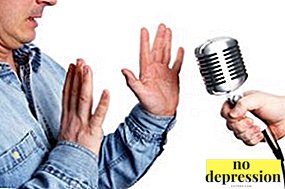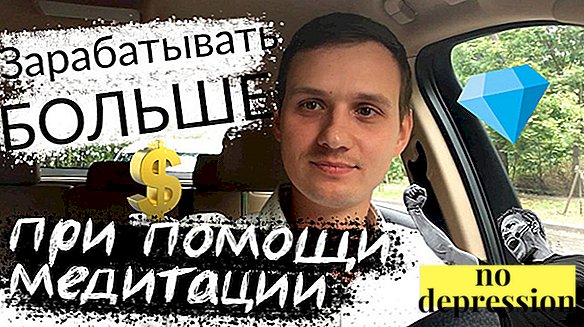Fear of public speaking may be a natural reaction of the organism, but with the regular occurrence of anxiety states accompanied by certain symptoms, specific mental disorder.
In psychological and psychiatric practice, such a disorder is designated by the term "glossofobia."
This phobia implies mandatory correction special exercises and recourse to a psychologist. Otherwise, the phobic state can create many difficulties in life.
What is the name of a phobia?

The fear of public speaking got its name "Glossophobia".
There is a definite line between the natural fear of the public and the phobia.
In the first case, anxiety arises before the responsible performance, and differ temporary character.
With glossophobia, an excessive sense of fear accompanies a person, regardless of the importance of the upcoming event. Difficulties may arise even if it is necessary to voice any information in front of several people.
What are the manifestations characterized?
Glossophobia has specific symptoms. This phobic condition manifests itself in the need for public speaking, regardless of the number of listeners and the duration of the report.
The feeling of anxiety arises long before the upcoming event, persists at the moment of contact with the audience and becomes the cause of a nervous shock.
Numerous factors can be the object of anxiety. Glossophob is excessively afraid of criticism, ridicule of people, lack of appearance or professional skills.
Features glossophobia:
 Attacks of the strongest anxiety occur regardless of the factor of familiarity with the public (fear of public speaking may be directed at unfamiliar or familiar people).
Attacks of the strongest anxiety occur regardless of the factor of familiarity with the public (fear of public speaking may be directed at unfamiliar or familiar people).- Psychological discomfort with this phobia is accompanied by physical signs (tremor of the limbs, disturbances in the cardiovascular system and digestion, febrile behavior, etc.).
Kinds
In psychiatric and psychological practice stands out several types of glossophobia. The symptomatology of these conditions is slightly different, but the objects of fear are different.
The definition of a specific form of phobia is necessary to find the most effective methods of dealing with the problem. In some cases, this can only be done by a qualified professional.
Glossophobia may occur in the following forms:
- peyraphobia (fear of the public);
- verbophobia (fear of oral speech);
- lalophobia (fear of stuttering or diction disorders).
Why are people afraid of the scene?

Glossophobia does not exclude the fact genetic predisposition.
This nuance characterizes the predominant number of phobias.
If parents suffer from fear of public speaking, then the child may have a phobic state at the genetic level or imposed by adult behavior.
For example, if a baby sees like mom or dad too worried before the report, a sense of potential danger may trigger the development of glossofobia.
Possible causes of glossophobia are the following factors:
- Children's fears (situations that could cause psychological discomfort in childhood, such as teasing children when reciting poems or singing a song), can provoke fear of public speaking.
- The development of neurotic diseases (the main manifestation of diseases in this category is the lack of control over one’s own emotions in certain situations, the consequence may be the development of glossophobia).
- The presence of complexesconcerning their own appearance or speech (it seems to a person that his appearance or speech will necessarily cause ridicule or excessive criticism from the public).
- Features of education (if parents pay excessive attention to the prohibition to lead a public life, then it may become a problem for a child to be photographed, speak to the public and perform other actions of a similar nature).
 Excessive severity in education, threats and frequent punishments, as well as constant criticism from parents (these factors provoke self-doubt in the child and are the main reasons for the development of phobic states).
Excessive severity in education, threats and frequent punishments, as well as constant criticism from parents (these factors provoke self-doubt in the child and are the main reasons for the development of phobic states).- Excessive Shyness (this character trait is one of the main reasons for the development of a fear of public speaking).
- Excessive fear of criticism on the part of the public (this factor can be both a character trait and a concomitant symptom of some neurotic abnormalities).
Symptoms and signs
Glossophobia provokes a certain person biological response. The degree of intensity of the symptoms of a phobic state depends on the individual characteristics of the psyche.
 In the presence of severe forms of phobia can cause disruption of the internal organs.
In the presence of severe forms of phobia can cause disruption of the internal organs.
Somatic signs in this case will be supplemented vegetative signs.
If glossophobia has serious neurotic abnormalities, then fear of public speaking can cause a panic attack.
Before the performance and before it starts at the glossophobe the following states appear:
- redness or paleness of the skin;
- nervous gestures;
- violation of intestinal tone;
- inadequate laughter;
- excessive sweating;
- dry mouth;
- nausea;
- acceleration of heart rate;
- voice tremor;
- strong muscular tension;
- fainting;
- changing facial expressions;
- feverish state;
- high blood pressure;
- feeling of "lump" in the throat;
- speech disorders and voice timbre;
- involuntary urination;
- tremor or numbness of the limbs.
What are the difficulties in life creates?

Glossophobia can become cause many problems In human life.
An important role is played by the age at which the symptoms of this phobic state manifested.
If the fear of public speaking arose in a child or teenager, then in the absence of timely psychological correction, there may be serious complicationsconcerning the psycho-emotional state and self-realization.
The consequences Glossophobia can be the following factors:
- poor performance in school and college;
- excessive closeness and shyness;
- lack of perspectives in professional activities;
- difficulties with employment.
How to overcome fear?
Ways to overcome glossophobia include several steps and techniques. The best way to combat this phobic state is appeal to a psychologist or psychotherapist.
Experts will not only identify the exact causes of phobias, but also select individual problem-solving techniques.
You can supplement the course of therapy exercisewhich are carried out at home and are aimed at improving self-esteem, developing personal qualities and correcting the psycho-emotional state.

In the treatment of glossophobia can be used the following techniques:
- hypnosis (one of the most effective ways);
- individual and group classes with a psychologist;
- drug therapy (in the presence of neurotic disorders).
What if you are afraid to speak to the public?
Psychologists recommend combating glossophobia by a specific algorithm.
It is necessary to go through four stages of working on your fears - awareness of the problem, a step-by-step analysis of the factors that provoked the phobia, search and development of ways to eliminate fear, fixing the result and testing skills in practice.
This effect is achieved with the help of special exercises and techniques.
- Carrying out autotraining (it is necessary to increase one’s own self-esteem by regular praising one’s self, revealing merits of a different nature).
- Relaxation and Mediation Training (mastering the method of relaxation of muscles and mental balance is one of the most effective ways to deal with the prevailing number of phobias).
- Creating a positive attitude (before the performance it is necessary to think only about a favorable outcome of events and in no case do not analyze possible negative factors).
 Control of your appearance (impeccable appearance enhances self-esteem and reduces the appearance of anxiety on a psychological level).
Control of your appearance (impeccable appearance enhances self-esteem and reduces the appearance of anxiety on a psychological level).- Counseling with a psychologist in the absence of a result of an independent struggle with glossophobia (you should not be ashamed of your fears, the fear of public speaking can greatly reduce the quality of life, progress and be complemented by other phobias, and also hinder career growth and self-realization).
Exercises at home
There are several techniques increase self-esteem and eliminate the fear of public speaking that can be done at home.
These methods are effective with a mild phobia.
If the cause of glossophobia is serious psychological trauma or neurotic disorders, then without the help of a specialist it will be practically impossible to rule with them.
Examples workouts:
- regular rehearsals in front of a mirror or close people;
- awareness of the importance of the upcoming performance (for yourself or others);
- drawing up a clear presentation plan and maximum study of its topic;
- work on facial expressions and gestures (in front of a mirror at the time of rehearsal);
- playing various situations that may arise during the performance;
- increase your own self-esteem (search for the maximum number of advantages).
How to overcome the fear of public speaking? 5 powerful tricks:
How to cope with the panic that arose on the scene?

If the fear of public speaking arises regularly, then they can be accepted sedatives (in adequate dosage).
Panic, which appeared on the stage at the moment of the report, is more difficult to fight, but some tips will help relieve tension.
The maximum efficiency of such techniques is achieved with the ability control your imagination. It is recommended to master this technique in the presence of phobic states.
When speaking, you must do the following:
- Identifying the public set up positive and friendly (these people need to focus their attention during the performance).
- If the fear of public speaking is accompanied by numbness or tremor of the limbs, then imagine yourself wetand then shake off the water.
- Relieve tension will help proper breathing (at the moment of phobic manifestation, breathing is most often disturbed, its normalization creates a soothing effect).
- Can introduce someone from close people among the public and concentrate on its “presence” (if you imagine that the listener of the report is a person you trust, then there may be no alarm).
The presence of glossophobia may be suspected even by a person who has significant experience of successful public speaking. Even famous speakers and public figures experience the feeling of anxiety before contact with the public.
It is important to understand the boundary between a mental disorder and a normal reaction to an important event. If signs of phobias appear regularly, then you need to be examined by a psychologist.
Secrets public speaking. Oratory. Psychologist tips:

 Attacks of the strongest anxiety occur regardless of the factor of familiarity with the public (fear of public speaking may be directed at unfamiliar or familiar people).
Attacks of the strongest anxiety occur regardless of the factor of familiarity with the public (fear of public speaking may be directed at unfamiliar or familiar people). Excessive severity in education, threats and frequent punishments, as well as constant criticism from parents (these factors provoke self-doubt in the child and are the main reasons for the development of phobic states).
Excessive severity in education, threats and frequent punishments, as well as constant criticism from parents (these factors provoke self-doubt in the child and are the main reasons for the development of phobic states). Control of your appearance (impeccable appearance enhances self-esteem and reduces the appearance of anxiety on a psychological level).
Control of your appearance (impeccable appearance enhances self-esteem and reduces the appearance of anxiety on a psychological level).

